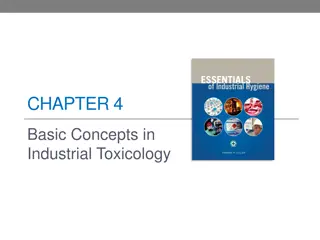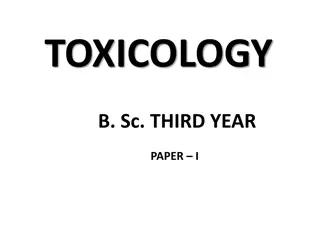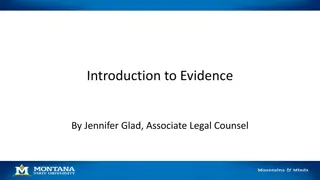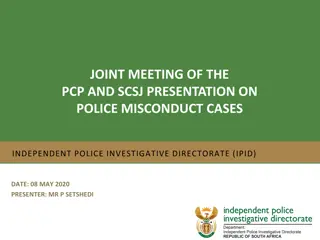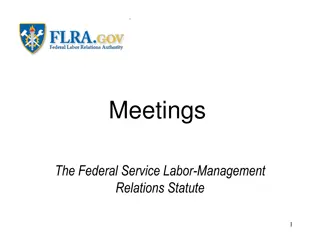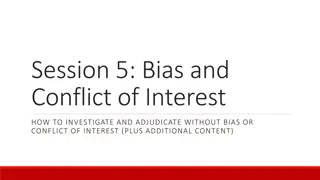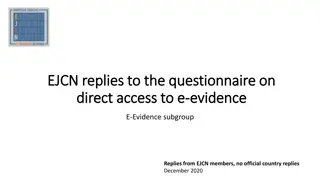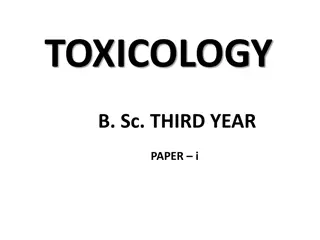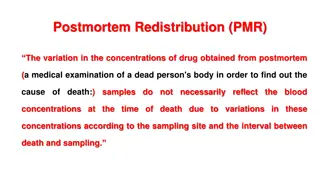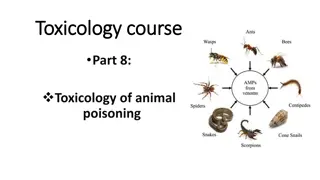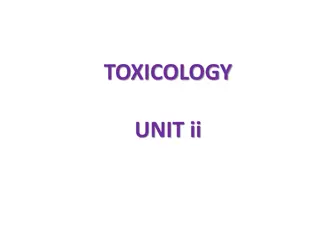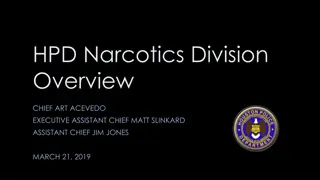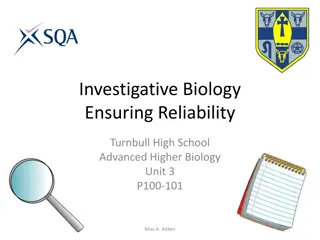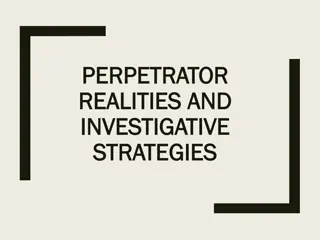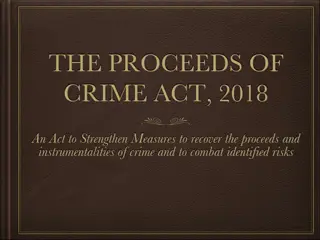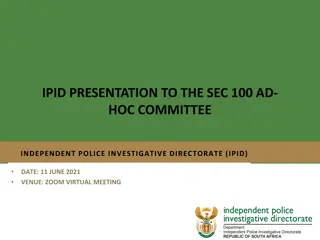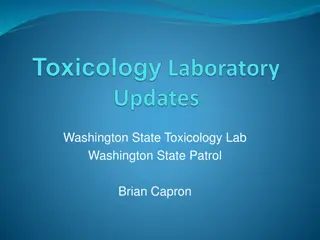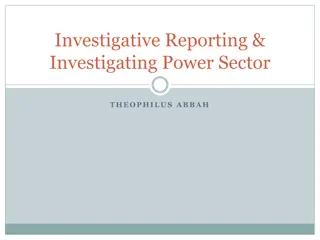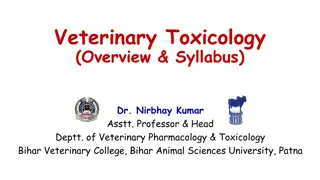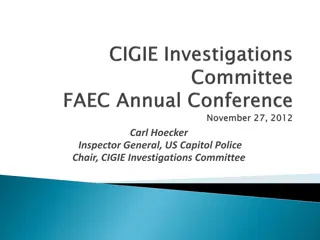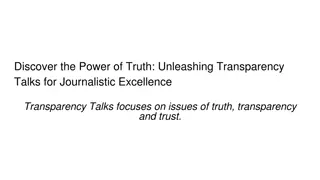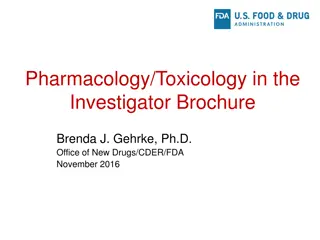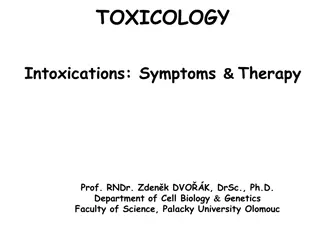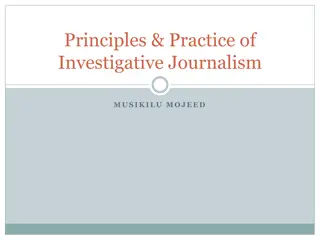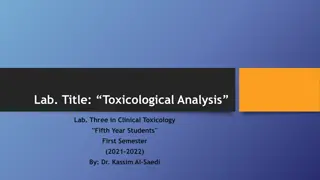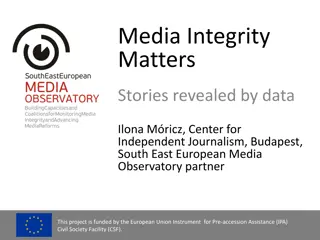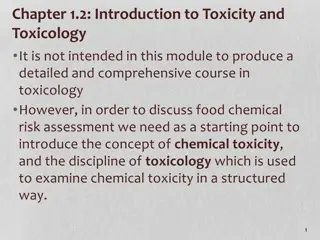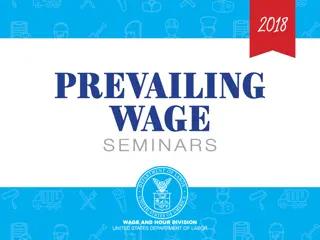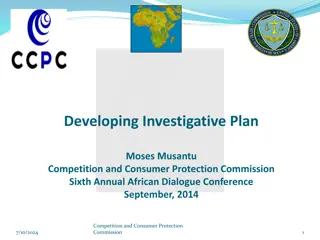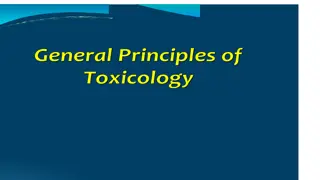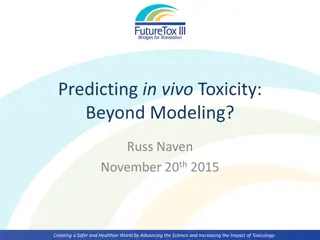Understanding Litigation Processes and Witness Testimony in Investigations
Explore the key steps in civil and criminal litigation processes, the role of expert witnesses, and the importance of investigative reports and testimony. Learn about witness responsibilities, Touhy regulations for federal employees, and the pre-trial phase in civil cases.
0 views • 40 slides
Blood Spatter Analysis Training Materials - Updated 2023
Learn about bloodstain pattern analysis, types of blood patterns, droplet analysis, and investigative techniques through comprehensive training materials. Explore the significance of blood spatter in crime scene investigations and understand how investigators derive crucial information from blood ev
5 views • 21 slides
Understanding Alibi Evidence in Criminal Cases: Reliability, Believability, and Vulnerabilities
Explore the complexities of alibi evidence in criminal cases, delving into the factors that determine the strength of an alibi and the challenges faced in assessing its reliability. Discover the impact of physical evidence, witness credibility, and systemic barriers on the believability of alibis, s
3 views • 31 slides
Guided Approach to Developing Investigative Skills with Card Set
Explore a card set designed to enhance investigative skills, comprising different types of cards - DBE Cards, Research Cards, and Reflection Cards. Each phase of the investigative process in the DBE cycle is supported by specific cards, aiding in questioning, knowledge generation, ideation, prototyp
8 views • 21 slides
Challenges and Solutions in Implementing Historical Competencies in Teaching
Explore the complexities and obstacles faced in implementing historical competencies in teaching, as discussed by Jens Aage Poulsen, a senior lecturer and researcher at HistoryLab, University College Lillebaelt, Denmark. The content delves into competence-based curriculum, core historical competenci
0 views • 7 slides
Understanding Basic Concepts in Industrial Toxicology
Industrial toxicology is a vital field that studies the effects of various agents on organism health through mechanisms of action, toxicokinetics, and more. It explores toxic chemical absorption, distribution, metabolism, and elimination, as well as toxic effects on major organ systems. Learn about
0 views • 35 slides
Understanding Toxicology: Dose-Response and Toxicity Assessment
The study of toxicology involves understanding dose-response relationships, lethal concentrations, tolerance limits, toxicity curves, and factors influencing toxicity. Dose, response, acute toxicity, chronic toxicity, LD50, and ED50 are key concepts in toxicology that help assess the effects of chem
2 views • 24 slides
Understanding Evidence in Investigations
Learn about the principles and types of evidence in investigations, including inculpatory and exculpatory evidence, physical, documentary, demonstrative, and verbal evidence. Explore sources of evidence and the significance of collecting relevant information to ensure a fair investigative process.
0 views • 14 slides
Presentation on Police Misconduct Cases by Independent Police Investigative Directorate (IPID) - Strategic Plan 2012/17 Joint Meeting
IPID, as an oversight body, investigates cases involving the police as mandated by the IPID Act. This presentation covers the legislative mandate, total case intake, COVID-19 related cases, gender-based violence cases, and comparisons of cases received. It also highlights cases related to police act
0 views • 23 slides
Understanding Formality in Meetings under the Federal Service Labor-Management Relations Statute
The Federal Service Labor-Management Relations Statute provides guidelines for formal discussions and investigative examinations in the context of labor relations. It outlines the rights of unions to representation in formal meetings, emphasizing the importance of subject matter and formality. The d
0 views • 34 slides
Investigating Bias and Conflict of Interest: Guidelines for Fair Adjudication
Explore the intricacies of bias and conflict of interest in investigations, learn how to identify and counteract them to ensure fairness in decision-making. Topics include understanding bias, detecting it, LGBTQ terminology, evidence collection, and remedial actions like recusal. Navigate the nuance
0 views • 21 slides
Unveiling Fake News: Digital Citizenship Lesson on Spotting False Information
Dive into a Digital Citizenship lesson focused on identifying fake news, exploring categories of false information, analyzing news sources' coverage of high-profile events, and learning tips to evaluate the credibility of news stories. Enhance your internet investigative skills with practical insigh
3 views • 10 slides
Implementation of Legal Frameworks for Electronic Evidence Gathering
The document provides insights into the legal frameworks governing direct access to electronic evidence in various countries. It covers aspects such as extended searches, access based on lawfully obtained credentials, and online searches. The responses highlight the availability and limitations of i
0 views • 5 slides
Safeguarding Legislation for Protecting the Rights of Older People in Ireland
Safeguarding legislation is crucial to protect older people from abuse and neglect in Ireland. Current safeguards fall short due to a lack of uniform regulatory frameworks and limitations on investigative powers. Establishing legal frameworks and an independent authority are vital for promoting the
0 views • 21 slides
Introduction to Toxicology: Science and Impact on Living Organisms
Toxicology is the study of adverse effects of chemicals on living organisms. It assesses probability of occurrence, quantitatively and qualitatively analyzing toxic effects. Toxicants are agents causing harmful responses in biological systems. Environmental toxicology focuses on pollutants' effects
0 views • 12 slides
Understanding Postmortem Redistribution in Forensic Toxicology
Postmortem Redistribution (PMR) refers to the variation in drug concentrations obtained from postmortem samples, which may not accurately reflect the levels at the time of death due to redistribution mechanisms. In forensic toxicology, assessing drug severity relies on blood concentrations, with cha
0 views • 16 slides
Understanding Animal Venom and Snake Classification in Toxicology
Animal venom, particularly snake venom, contains various toxins that can have detrimental effects on the body. Different types of snake venom target specific systems, such as neurotoxic venom affecting neuromuscular junctions and hemotoxic venom impacting the cardiovascular system. Understanding the
4 views • 27 slides
Overview of Toxicology: Understanding Chemical Risks and Health Impacts
Toxicology is a crucial field that assesses the effects of various toxic substances on human health and the environment. From heavy metals to solvents, radiation, pesticides, and animal toxins, this discipline plays a vital role in identifying and managing risks associated with exposure to harmful c
0 views • 25 slides
Houston Narcotics Division Overview and HIDTA Initiative
The Houston Police Department's Narcotics Division is tasked with combatting illegal possession, manufacture, and distribution of controlled substances. The division includes specialized investigative squads such as General Narcotics Enforcement, Houston Intelligence Service Center, Major Drug Squad
0 views • 10 slides
Understanding Precision, Accuracy, and Reliability in Investigative Biology
Precision, accuracy, and replicates play crucial roles in ensuring reliable results in investigative biology experiments. Precision refers to the closeness of measurements, accuracy to how close they are to the actual value. Replicates involve multiple measurements within the same experiment or repe
0 views • 6 slides
Understanding Sexual Assault Perpetrators: Dynamics, Behaviors, and Strategies
Explore the manipulative and opportunistic behaviors of sexual assault perpetrators, who prey on vulnerable victims and use power dynamics to assert control. Uncover common myths and stereotypes about perpetrators, and delve into investigative strategies to identify and address their actions effecti
0 views • 27 slides
Strengthening Measures Against Financial Crimes: The Proceeds of Crime Act 2018
The Proceeds of Crime Act 2018 aims to enhance efforts in recovering proceeds of crime and combating various risks such as money laundering, terrorism financing, corruption, and human trafficking. The act introduces measures like civil forfeiture, unexplained wealth powers, investigative orders, and
0 views • 65 slides
IPID Presentation to the Ad-hoc Committee on Independent Police Investigative Directorate (IPID)
The IPID presentation discussed interference with the Sec. 100 intervention team, engaging in corrupt practices, and mismanagement of government resources. Investigations related to the North West General Mabula team and cases against Lt. General Phahlane were highlighted. The presentation provided
1 views • 11 slides
Toxicology Laboratory Updates and Certifications
The Washington State Toxicology Lab, under the Washington State Patrol, has recent staffing updates, including new hires and return of staff on maternity leave. Updates on validated methods and toxicologist certifications are provided, showcasing the lab's commitment to quality and accuracy. A new t
0 views • 26 slides
Investigative Journalism: Tracing and Utilizing Abandoned Power Infrastructure in Rural Nigeria
The case study of Theophilus Abbah highlights the challenges posed by abandoned electricity infrastructure in rural areas of Nigeria, affecting both motorists and local communities. As an investigative journalist specializing in the power sector, the objective is to uncover the responsible parties b
0 views • 13 slides
Overview of Veterinary Toxicology Syllabus and Topics Covered
Detailed overview of the Veterinary Toxicology syllabus including general toxicology, toxicity caused by metals and non-metals, poisonous plants, agrochemical toxicity, fungal and bacterial toxins, venomous bites and stings, and more. The syllabus covers a wide range of topics related to toxicology
0 views • 12 slides
Overview of Investigations in Public Service
Explore the role of investigative committees and communities in upholding standards and combating fraud through collaborative efforts. Learn about the process, predication, and definition of investigations in various sectors such as healthcare, procurement, and law enforcement. Discover the impact o
0 views • 22 slides
Enhancing Statistical Inference in Educational Investigations
This content delves into the importance of integrated statistical and contextual knowledge for achieving success in Level 3 NCEA statistics involving the statistical enquiry cycle. It emphasizes the essential steps of posing investigative questions, utilizing appropriate statistical methods, discuss
0 views • 26 slides
Unleashing Transparency Talks for Journalistic Excellence
Delve into the transformative world of investigative journalism through the podcast "Transparency Talks" by the Centre for Collaborative Investigative Journalism. Gain insights from dedicated journalists on their challenges, lessons learned, and commitment to uncovering the truth. Join this enlighte
0 views • 7 slides
Understanding Pharmacology and Toxicology in Investigator Brochures
Explore the essential aspects of pharmacology and toxicology covered in Investigator Brochures, including nonclinical information, safety pharmacology, general toxicology, genetic toxicology, and more. Learn about the significance of pharmacology in predicting intended and unintended effects, consid
1 views • 40 slides
Overview of Toxicology: Intoxications, Symptoms, and Therapy
Understanding toxicology is crucial to dealing with various types of intoxications, including accidental, foodborne, inhalation, industrial, and intentional exposures. Symptoms of toxic exposure can vary widely, affecting different body systems such as the cardiovascular, respiratory, and nervous sy
0 views • 9 slides
Unveiling the Art of Investigative Journalism
Investigative journalism involves uncovering concealed information, whether intentionally hidden by powerful individuals or obscured amid a sea of facts. It requires utilizing a variety of sources, both public and covert. This practice distinguishes itself from conventional journalism by delving dee
0 views • 41 slides
Analytical Toxicology: Techniques and Sample Analysis in Clinical Toxicology
Analytical toxicology involves the observation, identification, and measurement of foreign compounds in biological and other samples, such as urine, blood, stomach contents, nails, hair, and DNA. Various techniques are used to isolate and identify drugs and poisons present in these samples. This fie
0 views • 12 slides
Investigative Stories Unveiling Media Integrity Issues in Southeast Europe
Investigative journalism efforts supported by the South East European Media Observatory reveal corrupt practices and flaws in the media systems of Southeast Europe. Through translating data into impactful stories, journalists uncover issues such as political influence in media ownership, subversion
0 views • 8 slides
Introduction to Toxicity and Toxicology in Food Chemical Risk Assessment
This module introduces the concept of chemical toxicity and the discipline of toxicology in relation to food chemical risk assessment. It touches upon historical aspects, such as the case of Socrates' death by hemlock, the contributions of Mathieu Joseph Bonaventure Orfila in forensic toxicology, an
0 views • 18 slides
Understanding Investigative Process and Fund Disbursement in Employment Law
Delve into the investigative process, fund withholding, and disbursement under SCA/CWHSSA/FLSA regulations. Explore the steps involved, reasons for investigations, compliance issues, and preliminary steps in conducting thorough inquiries in the realm of employment law.
0 views • 16 slides
Developing an Effective Investigative Plan for Competition and Consumer Protection
Investigative planning is crucial in competition and consumer protection cases to efficiently allocate resources, focus on key issues, and guide investigations. This involves defining the plan, setting objectives, outlining steps for development, and adapting the plan as needed. The process aims to
0 views • 14 slides
Understanding Toxicology and Measures of Toxicity
Toxicology is the study of the adverse effects of chemicals on living organisms, involving xenobiotics and poisonous substances. Toxicologists examine the nature of these effects, testing in lab animals for measures of toxicity such as mortality, teratogenicity, carcinogenicity, and mutagenicity. Ke
0 views • 18 slides
Advancing In Vivo Toxicity Prediction Beyond Modeling
Explore the challenges and opportunities in predicting in vivo toxicity beyond traditional models. Learn about confidence in toxicity prediction, recently discontinued drugs due to safety concerns, and the importance of recognizing toxicological signals in preclinical stages. Discover how computatio
0 views • 27 slides
Understanding Food and Nutritional Toxicology
Food and nutritional toxicology delve into the science of poisons, toxins, and toxicants found in food. It covers substances harmful to consumers, including natural toxicants, contaminants, and additives. Nutritional toxicology focuses on the overlap between nutrition and toxicology, exploring the i
0 views • 17 slides





